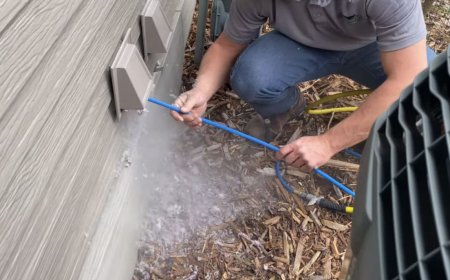Understanding Psychotherapy, Behavioral Therapy, and Ketamine Therapy Nasal Spray: A Modern Approach to Mental Health Treatment

Mental health treatment has evolved significantly over the past few decades. While traditional methods like psychotherapy and behavioral therapy remain foundational, innovative treatments like ketamine therapy nasal spray have entered the scene, offering new hope for individuals struggling with treatment-resistant mental health conditions. This article will explore how these three therapeutic approachespsychotherapy, behavioral therapy, and ketamine therapy nasal spraywork individually and how they can complement one another in holistic mental healthcare.
What is Psychotherapy?
Psychotherapy, often referred to as talk therapy, is a broad term that encompasses a variety of treatment techniques aimed at helping individuals understand their emotions, thoughts, and behaviors. Psychotherapy is typically conducted by a licensed therapist, psychologist, or psychiatrist and can take many forms, including:
- Cognitive Behavioral Therapy (CBT)
- Dialectical Behavior Therapy (DBT)
- Psychodynamic Therapy
- Humanistic Therapy
- Interpersonal Therapy
Psychotherapy helps individuals cope with issues such as anxiety, depression, trauma, relationship problems, and more. The goal is to improve mental health, enhance quality of life, and develop healthier thinking patterns.
Behavioral Therapy: A Subset of Psychotherapy
Behavioral therapy is a specific type of psychotherapy that focuses on changing maladaptive behaviors. Rather than delving deeply into past experiences, behavioral therapy emphasizes the present and works on identifying and replacing harmful behaviors with healthier ones.
There are several types of behavioral therapy, including:
- CBT (Cognitive Behavioral Therapy): This widely used approach helps patients identify negative thinking patterns and change them.
- Exposure Therapy: Often used for phobias or PTSD, it gradually exposes individuals to the source of their fear in a controlled environment.
- Operant Conditioning: Based on reinforcement, this method encourages desired behaviors through rewards or discourages unwanted behaviors with consequences.
Behavioral therapy is particularly effective for conditions like obsessive-compulsive disorder (OCD), phobias, anxiety disorders, and attention-deficit/hyperactivity disorder (ADHD).
The Role of Ketamine Therapy Nasal Spray in Mental Health
In recent years, ketamine therapy nasal spray has emerged as a promising new option for individuals with treatment-resistant depression and other severe mental health conditions. Originally developed as an anesthetic, ketamine has shown rapid and substantial antidepressant effects in clinical settings.
Esketamine, a derivative of ketamine, is administered via a nasal spray under medical supervision. The FDA has approved esketamine (marketed as Spravato) for use in conjunction with an oral antidepressant for adults with treatment-resistant depression.
How Ketamine Therapy Nasal Spray Works
Unlike traditional antidepressants that can take weeks to show effects, ketamine therapy nasal spray often delivers noticeable improvements within hours or days. It works by modulating the brains glutamate system, which plays a critical role in mood regulation, cognition, and neural plasticity. Ketamine also encourages the growth of new synaptic connections in the brainpotentially reversing damage caused by chronic stress and depression.
Integrating Psychotherapy, Behavioral Therapy, and Ketamine Therapy
Mental health care is not one-size-fits-all. In fact, the most effective treatment plans often combine different therapies. Heres how psychotherapy, behavioral therapy, and ketamine therapy nasal spray can work together:
1. Enhancing Outcomes with Talk Therapy
After receiving a dose of ketamine therapy nasal spray, many patients report a temporary shift in mood, perception, and cognitive flexibility. This period can be ideal for psychotherapy, as patients may feel more open to exploring thoughts and emotions that were previously inaccessible due to mental fog or emotional numbness.
2. Behavioral Reinforcement During Vulnerable Phases
Following ketamine treatment, integrating behavioral therapy can help patients maintain the positive changes initiated by the therapy. For example, CBT can guide patients to adopt healthier coping strategies and disrupt negative behavior loops that perpetuate anxiety or depression.
3. Building Long-Term Resilience
While ketamine therapy nasal spray may provide quick relief, psychotherapy and behavioral therapy are essential for long-term mental health stability. They help individuals understand the root causes of their issues and equip them with tools to manage stress, relationships, and self-care.
Who is Ketamine Therapy Nasal Spray For?
Ketamine therapy is not for everyone and must be administered under strict medical supervision. It is generally reserved for individuals who:
- Have treatment-resistant depression
- Have not responded to at least two different antidepressant medications
- Are not currently experiencing psychosis or certain substance abuse issues
A mental health professional will conduct a thorough evaluation before recommending ketamine therapy nasal spray.
Safety and Side Effects
Ketamine therapy nasal spray is generally well-tolerated, but like any medical treatment, it comes with potential side effects. These can include:
- Dizziness or dissociation
- Nausea
- Elevated blood pressure
- Feeling disconnected or sleepy
Because of these side effects, ketamine therapy must be administered in a clinical setting, where patients are monitored for at least two hours post-treatment.
Final Thoughts: A Multi-Faceted Approach to Mental Wellness
The modern landscape of mental health treatment offers more tools than ever before. Psychotherapy provides a safe space to process emotions and trauma. Behavioral therapy offers structured techniques to change harmful patterns. And ketamine therapy nasal spray represents a cutting-edge solution for those who havent found relief through conventional methods.
When used together, these therapies can address mental health challenges from multiple anglesbiological, psychological, and behavioral. This integrative approach ensures a more comprehensive path to healing, especially for individuals with complex or severe mental health needs.
If you or someone you know is struggling with mental health and has not found success with traditional therapy alone, it may be time to explore how these three approachespsychotherapy, behavioral therapy, and ketamine therapy nasal spraycan work together to create lasting change.




































